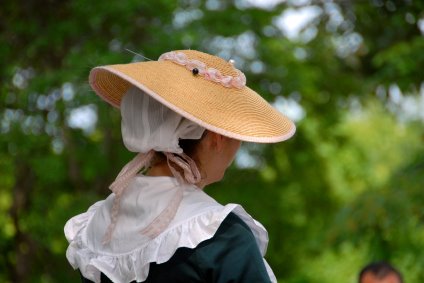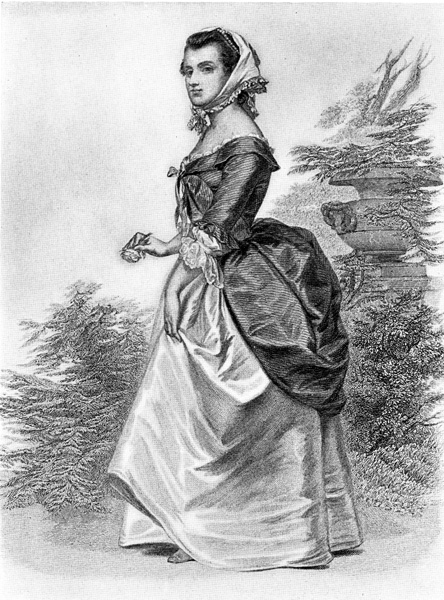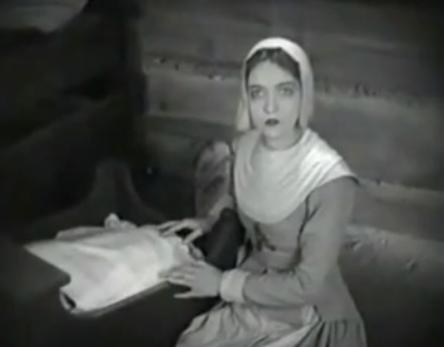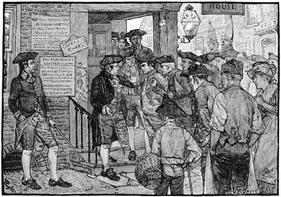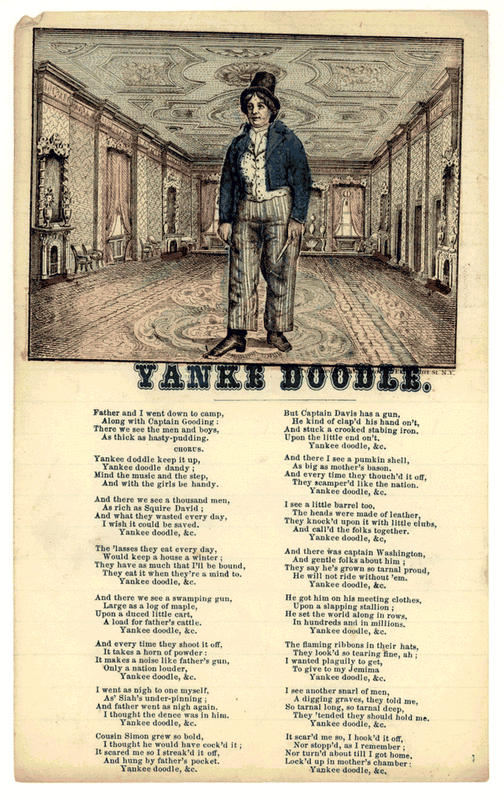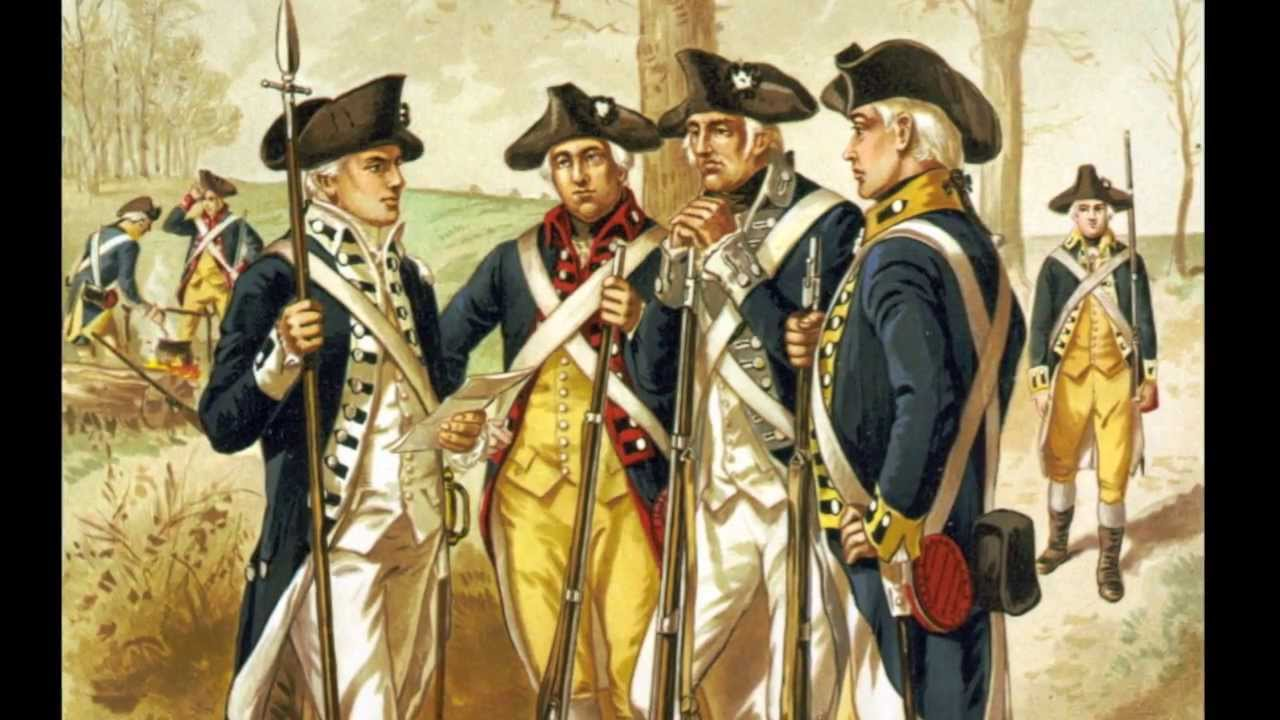|
Originating in the British Islands, "Katy Cruel" was imported at an early date, possibly as early as the mid to late 1600's. The song found popularity with the hard working immigrants. The lyrics diversified as did the tempo of the melody. The song is showing up again in modern recordings and performances of American folk music. The melody's tempo ranges from almost a jig or hornpipe to ballad to lament. The lyrics here were copied from The American Songbook, 1881, New York.
Katy Cruel (Well known by early 1700's) Traditional When I first came to town, They called me the roving jewel; Now they've changed their tune, They call me Katy Cruel, Oh, diddle, lully day, Oh, de little lioday. Chorus Oh that I was where I would be, Then I would be where I am not, Here I am where I must be, Go where I would, I can not, Oh, diddle, lully day, Oh, de little lioday. When I first came to town, They brought me the bottles plenty; Now they've changed their tune, They bring me the bottles empty, Oh, diddle, lully day, Oh, de little lioday. Chorus I know who I love, And I know who does love me; I know where I'm going, And I know whose going with me, Oh, diddle, lully day, Oh, de little lioday. Chorus Through the woods I go, And through the bogs and mire, Straightway down the road, And to my heart's desire, Oh, diddle, lully day, Oh, de little lioday. Chorus Eyes as bright as coal, Lips as bright as cherry, and 'tis her delight To make the young girls merry, Oh, diddle, lully day, Oh, de little lioday. Chorus Source: The American Songbook, 1881. |
|
The Escape of Old John Webb
1738 Words and Lyrics: Unknown There were nine to guard the British ranks, and five to guard the town about, And two to stand at either hand, and one to let old tenor out. There was eighty weight of good Spanish iron, Between his neckbone and his knee, But Billy took Johnny under his arm And lugged him away right artfully. Chorus: And Billy broke locks, And Billy broke bolts, And Billy broke all that he came nigh, Until he came to the dungeon door, And that he broke right manfully. They mounted their horses and away did ride (And who but they rode gallantly), Until they came to the river bank, And there they alighted right merrily. And then they called for a room to dance (And who but they danced merrily), And the best dancer among them all Was old John Webb who was just set free. Chorus Source: The American Songbook, 1881. |
The Escape of Old Webb was printed as a broadside in Boston in the 1730's. The story is that John Webb,from Salem, Massachusetts, was a counterfeiter who was spreading Rhode Island colony five pound notes. The irritated British government finally located and arrested Webb and one Bill Tenor. According to legend, an angry mob stormed the jail and freed the two. Massachusetts had been suffering from severe cash shortages, resulting in many being tossed into debtors' prison. The colonists were happy to accept the money as real. The false notes increased cash flow and allowed many debtors to be released from jail and also stimulated the economy, all this making Webb most popular. Bill Tenor of the song is possibly a reference to the slang for Pound Sterling Notes was 'Old Tenor Bills of Credit.' No real proof exists that the events occurred and so are treated as legend. However, the Boston Evening Post records years later that one John Webb had been arrested for counterfeiting but not convicted, and so let free. The song became a hit and remains in many song books of Colonial Era music. |
Yankee Doodle
|
As We Learned as Kids
Yankee Doodle went to town A-riding on a pony He stuck a feather in his hat And called it macaroni Chorus: Yankee Doodle, keep it up Yankee Doodle dandy Mind the music and the step and with the girls be handy! Father and I went down to camp Along with Captain Gooding And there we saw the men and boys As thick as hasty pudding. Chorus And there was Captain Washington And gentle folks about him They say he's grown so tarnal proud He will not ride without them. Chorus Source: Girls Scouts of American website. Yankee Doodle
As sung originally in the taverns of Philadelphia and Boston, this rendition was well known throughout the Colonies. It was even sung, according to various accounts, during "Tavern Meetings" by members of the Continental Congress. Source: Harvard University Sheep's head and Vinegar Butter Milk and Tansy [wild herbs] Boston is a Yankee town Sing Yankee Doodle Dandy Chorus: Yankee Doodle Doodle doo, Yankee Doodle Dandy Mind the Music and the Step, With the Girls be handy. Christmas is a-coming boys, We'll go to Mother Chases, And there we'll get a sugar drum All sweetened with Melasses. Chorus: Heigh ho for our Cape Cod, Heigh ho Nantasket Do not let the Boston wags Fill your oyster basket. Chorus Dolly Bushel let a Fart, Jenny Jones she found it,* Ambrose carried it to the mill ** Where Doctor Warren*** ground it. Chorus Two and two may go to Bed, Two and two together, And if there is not room enough Lie one on top of t'other. Chorus * A reference to well-known prostitutes in 18th century London. ** Ambrose Serle, British author ranting against the Revolution based on his religious views. *** A colonial hero at Bunker's Hill |
As Sung by Washington's Soldiers Fath'r and I went down to camp, Along with Captain Gooding, And there we saw the men and boys As thick as hasty pudding. Chorus And there we saw a thousand men As rich as Squire David, And what they wasted every day, I wish it could be saved. Chorus The 'lasses they eat it every day, Would keep a house a winter; They have so much, that I'll be bound, They eat it when they've mind ter. Chorus And there I see a swamping gun Large as a log of maple, Upon a deuced little cart, A load for father's cattle. Chorus And every time they shoot it off, It takes a horn of powder, and makes a noise like father's gun, Only a nation louder. Chorus I went as nigh to one myself As 'Siah's inderpinning; And father went as nigh again, I thought the deuce was in him. Chorus Cousin Simon grew so bold, I thought he would have cocked it; It scared me so I shrinked it off And hung by father's pocket. Chorus And Cap'n Davis had a gun, He kind of clapt his hand on't And stuck a crooked stabbing iron Upon the little end on't Chorus And there I see a pumpkin shell As big as mother's bason, And every time they touched it off They scampered like the nation. Chorus I see a little barrel too, The heads were made of leather; They knocked on it with little clubs And called the folks together. Chorus And there was Cap'n Washington, And gentle folks about him; They say he's grown so 'tarnal proud He will not ride without em'. Chorus He got him on his meeting clothes, Upon a slapping stallion; He sat the world along in rows, In hundreds and in millions. Chorus The flaming ribbons in his hat, They looked so tearing fine, ah, I wanted dreadfully to get To give to my Jemima. Chorus I see another snarl of men A digging graves they told me, So 'tarnal long, so 'tarnal deep, They 'tended they should hold me. Chorus It scared me so, I hooked it off, Nor stopped, as I remember, Nor turned about till I got home, Locked up in mother's chamber. Chorus Source: Library of Congress |
